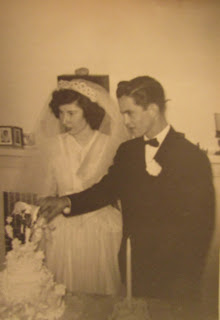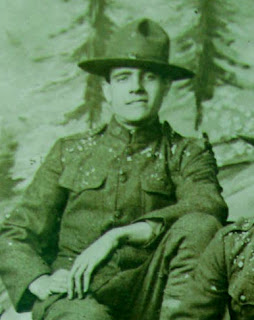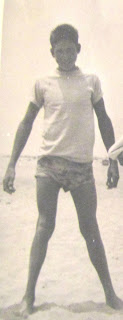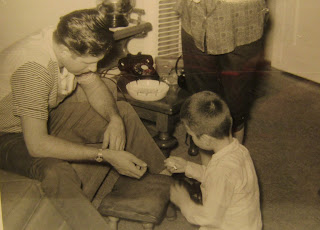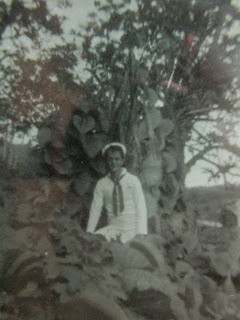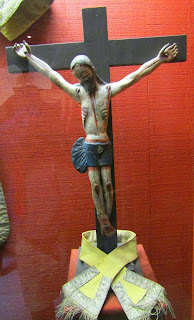Scripture
readings: Genesis 3:17-20; 1 Corinthians 15:12-22; Luke 24:1-12
| Southern California and Santa Catalina Island, June, 2018 |
So, a guy
was taking his family through this Bible Zoo, and around these exhibits. They
came to the one with the verse from Isaiah 11:6-7 “The lion shall lie down with
the lamb”. That’s not actually in the Bible that way. (There are wolves and
lambs, and lions and calves, but not lions and lambs. We shouldn’t fuss about
this.) But, the zoo had them lying down together, anyway, on a small lawn with
a lily pond, because everyone was expecting to see them like that.
This guy
was amazed to look at them: the lion and lamb together and quiet. He turned to
a nearby groundskeeper and asked him: “How do they do that?” And the groundskeeper
replied, “Well, they have to replace that lamb every day.”
A few
weeks ago, I was thinking about what I had to get done that day. I said to
myself, “I hope it doesn’t freeze tonight.” I hoped that because I hadn’t
gotten around to insulating my outdoor faucets yet. In spite of my hopes, I
left my other stuff undone, for a while, in order to get those faucets covered.
Of
course, once that was done, I didn’t have to hope that it wouldn’t freeze that
night. In fact, I didn’t need hope at all, anymore.
People
like me say that kind of thing all the time. “I hope this doesn’t happen. But I
sure hope that happens instead.” We’re not talking about hope at all. We’re
talking about wishes: only wishes.
It’s as
though we have no idea what hope means.
Our three
readings from the Scriptures are about hope, or about the lack of it, or about
why our hopes are so weak and small.
The
reading from the third chapter of Genesis (Genesis 3:17-20) tells us that we
humans, who were given the opportunity to live abundantly and forever, chose
death over life when they ate the fruit of a knowledge that was way too much
for them to digest. They ate the knowledge that was too much for them, in order
to make themselves like God.
They knew
they shouldn’t do this. They knew that death was part of their choice. Waiting
for the God who walked with them in the garden to choose a time to give them
the fruit if he thought it was time for it, that could have been one of their
greatest hopes, but they chose against hope and for their own destructive desires.
We inherited from them a nature that prefers desires (and even wishes) to hope.
Adam and
Eve believed false hopes (or wishes) in the form of lies, because choosing the
lies served them better than faith and hope. The result of this lost capacity
for a reliable, God-centered faith and hope, is that we find ourselves in this broken
world, and in these broken lives, where death seems stronger than life, and
evil seems stronger than love, and stronger than God.
Because
we have inherited the mental and spiritual deformities of sin, and of this
world, we can only see the evidence of what has gone wrong, and we can only see
that the odds are against hope. We don’t realize that God isn’t bound by what
we see, or by how we count our chances. In God, in Christ, hope is not about
the evidence. Hope is not about the odds.
They
thought that perfection and glory were only possible for spiritual beings,
because they believed that all matter (like their bodies) marched in lock step
with decline and decay. If Jesus raised his own body from the dead, then he was
doomed and so were they.
They didn’t
want to save the world they lived in, and they didn’t want themselves to be saved
in flesh, and blood, and bone. They wanted to escape from the world. They
wanted to escape from their bodies. They wanted to be souls only; flying around
freely in a far-away heaven.
 Paul told
them that exactly the opposite was true. Paul told them that the salvation and
life that came from Christ was a lie if Christ was unable to conquer this
world, and their bodies, and everything wrong with this universe. Christ was
able to do anything he chose. Christ could conquer and heal and empower everything
good. Christ could conquer everything created by God for good, no matter how much
of a lost cause it may seem.
Paul told
them that exactly the opposite was true. Paul told them that the salvation and
life that came from Christ was a lie if Christ was unable to conquer this
world, and their bodies, and everything wrong with this universe. Christ was
able to do anything he chose. Christ could conquer and heal and empower everything
good. Christ could conquer everything created by God for good, no matter how much
of a lost cause it may seem.
Timothy Keller says this about the conquest of
Jesus, and what it means for our lives. “If Christianity is true, the good things we
have cannot be lost.” Jesus enlarges our hopes to include every gift that lifts
our hearts and gives us joy.
The
Corinthians had made the mistake of settling for hopes that were much too small.
They felt safer with smaller hopes, but small hopes don’t make a full life. They
would only find life if they had a large and daring hope; only if they hoped for
the unimaginable and the seemingly impossible and stake their faith and hope on
a God who promised to take care of it.
In Luke’s
telling of the resurrection of Jesus from the dead, the angels told the women who
had come to the tomb: “Why do you seek the living among the dead? He is not
here; he has risen! Remember how he told you….” (Luke 24:5-6) Jesus had already
told all of his followers, many times, what he had to do. Jesus had promised
them, many times, that he was more than able to truly do it all.
The women
at the tomb, and the other disciples, had made God smaller than sin, and
smaller than death. They measured their God by the yardstick of their own loss
and grief.
They had
made their God too small. They had hearts too small for the hope that comes
from God: the hope that God insists on giving us. And we often do the same.
The
greatness of God, that we see at work in Jesus, is the Lord’s yardstick to
measure our hopes and dreams. So here it is.
God’s goodness
is stronger than evil and sin.
God’s peace-making
is stronger than our division and alienation from him, and from others, and
from the creation.
God’s
peace-making is stronger than all our divisions, our conflicts, our covetousness,
our envies and jealousies; stronger than the wounds we give and the wound that
we receive.
God’s
abundance is stronger than our needs.
***
If we
have faith in this God; if we trust this stronger God, then our faith will grow.
Then, Hope will sprout out from our faith. Our lives will be empowered, and
changed, and set free by faith, and hope, and love, in the form of Jesus.
We will live
up to God’s gifts more than we live down to our losses and griefs.
We will
live up to God’s eternity more than we live down to the limits of our time and
strength.
We will
live up to God’s crosses more than we live down to our compromises.
We will
live up to God’s mysteries more than we live down to human common sense.
We will
live up to God’s self-giving in Christ more than we live down to our own self-preservation.
We will
live up to God’s humility and servanthood in Jesus more than we live down to
our own dignity.
We will
live up to the abilities of God’s grace more than we live down to our own sense
of weakness and disqualification.
Living by
great and daring hopes, as well as living by great and daring faith and love,
will make us faithful witnesses to the good news of the gospel. We’ll join the
fellowship of all God people in heaven and earth in the unimaginable purpose to
which God has called us, in Jesus: “To make known among the Gentiles (or among
the nations) the glorious riches of this mystery, which is Christ in you, the
hope of glory.” (Colossians 1:27)
